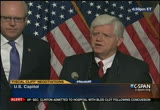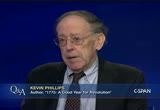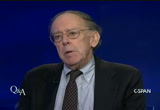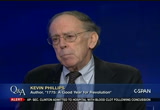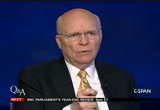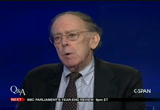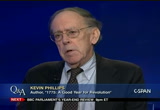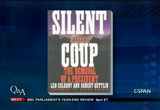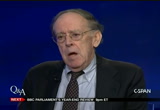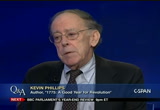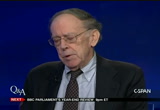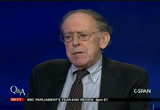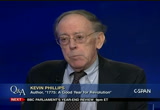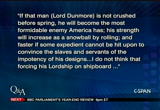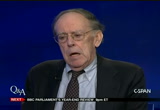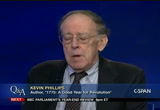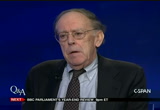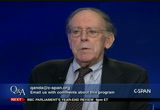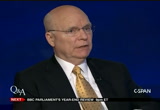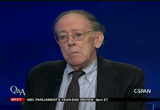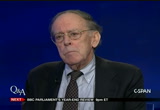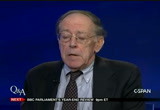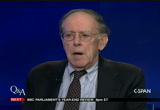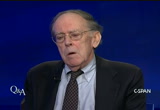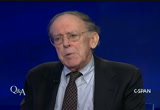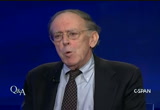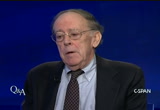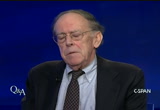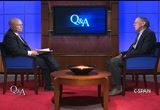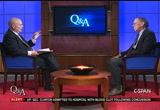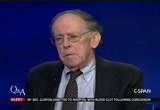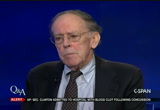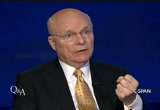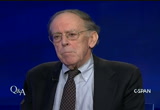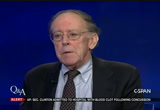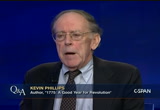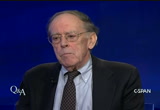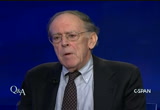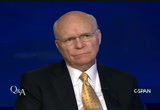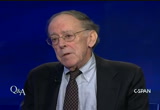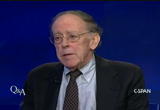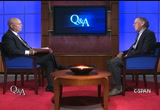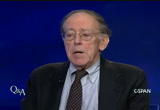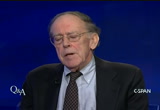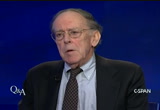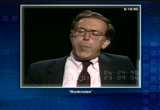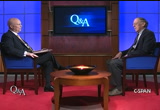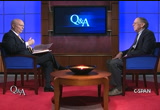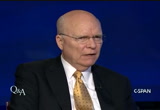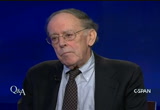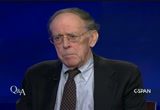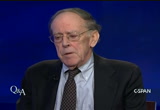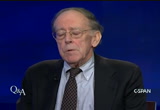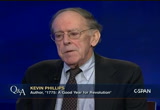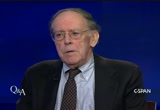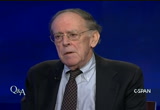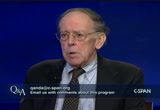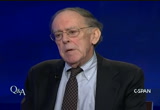tv Q A CSPAN December 30, 2012 8:00pm-9:00pm EST
8:00 pm
senses and do the right thing. >> thank you. it is our intent to caucus every day we are here, and we will be engaging with the press after those caucuses as well. i apologize -- we will have to go up and vote. thank you so much. >> tonight, "q&a with kevin phillips. later, the latest from the fizzled with the negotiations on people. -- the fiscal cliff negotiations on capitol hill. >> this week on "q&a," kevin
8:01 pm
phillips discusses his historical narrativnarrative. >> kevin phillips, at the end of your preference, you have a paragraph that says the year 1774-17 steny 5 had more than their fair share of unsung heroes. -- 1775 had more than their fair share of unsung heroes. what are you getting at? >> one of the things i like best about 1775, which was a much more spurned group of people, granted the founding fathers -- more inspiring group of people, granted, the founding fathers
8:02 pm
were not always -- seven out of the 10 counties, metropolitan washington, it is the country did is still great but a capital that is not. would have predicted that? >> if anyone would have guessed that there would be a country of 300 million people, they may wouldn't come up with a bit of cynicism. but they were dedicated people. >> you say, during the last four years, during the campaign of 2012, you stuck your nose at
8:03 pm
this. >> the first time i did something like that was back in the 1990's. i wrote a book about the english speaking civil wars, the american revolution. i did it thinking about bill clinton and newt gingrich. it was nice to take a vacation from those guys. when i ran out of gas writing books about politics and economics, which i did a number of between 2002 and 2008, and said it is time to go back in history again. hop in my time capsule and forget about these fellows. and i have forgotten about them pretty well. i cannot remember, for example, the name of the governor of texas who was such a jerk in the primary. [laughter] effect that he could not remember the departments in the government, i guess it is a
8:04 pm
little forgivable. i did it for the same reason in many respects. i wanted to deal with something i liked, that i thought was worth pursuing. and a long time ago, i did a book called "the emerging republican majority." i thought i would take the methodologies that i would use in that book and try to come up with a good explanation of the realignment of 1775. that is a good part of what this new book is about. >> before we get into this, a number of years ago, he called you a liberal. we have known you over the years as supposedly a conservative. and does your own views on
8:05 pm
liberal conservatives now pierre .> wrot i was always a bit more of a populist. been't think i have ever where i would call a liberal. somebody might call me a progressive. certainly even within the republican party. outsider, and i-establishment carrion, -- anti-a stable monetary and -- anti establishmentarian. >> what did you think of richard nixon when you worked with him? >> i liked him better after i
8:06 pm
wasn't working with him and he was out of the presidency. he is a very intelligent man, a man with the enormous personal problems in terms of relating to people. and i understand much better, which i did not a time when i worked for him, how he was not an effective administrator and how he couldn't keep all those worms in the can, whether you are talking about the administration or special watergate pierre >> had been to keep up with him after the years that he was president? >> he read one of my books from the early 1980's that feel like. somehow, we started having correspondence again. i would see him max for times of year. his office was up in new york and then in saddle river, new jersey. so when i would go from washington to our house in
8:07 pm
connecticut or sometimes i would stop and see him. and we would discuss politics and some of the things that had not been the school -- had not been discussedable before. >> did you ever get in setting to watergate and how that happened? >> i think i got a little. for example, one time, this was probably in 1992 or thereabouts. he told me and he indicated that john mitchell thought so, too, that this book that was coming out, "silent coup" -- do you remember that one? that was probably some of what happened. he quoted mitchell on the cover.
8:08 pm
they thought that this was sort of how it happened. so i got that sense from him. >> going back to your book on 1775, how did you pursue it to? how did your research it? how do have to go? -- how did you have to go? >> i have been interested in the revolution since there was a little kid. i was probably eight or nine when i would make a list of generals. i did nothing that was heading for anything very useful, but i always enjoyed that. then, when i did "the cousins i did somee 1990's, research on the revolution.
8:09 pm
i can go back and look at them whenever want to. but i must have wound up with 600, 800, 1000 books on the revolution. read and get a i lead for something else. i knew where an awful lot of counties were in the eastern states. you could give me the name of the town or name of the county and i could call it, a big help in dealing with a lot of parochial things. the average person would say i am not going to read this because i don't know where those places are. and generally did not have to go to a map much. i did research the way i have always done it, pretty much of myself. bring it all myself and having it there. basically thinking it out or
8:10 pm
not thinking out, off by myself. >> which character in the 1775 book, both british and american, was the most interesting to you? >> actually, a lot more interesting. if you think interesting in were thesignificant important impression, george washington was probably people think of him as, enormously impressive in a lot of ways. he was very careful in what he did to crate that image. -- to create that image. he made a number of mistakes. the rest of the time, he was very good. sam adams, i have enormous
8:11 pm
respect for him. he burned a lot of records that might have told us more about him. but i think he seemed a lot of things brilliantly. i think, for example, he knew what happened at lexington and concord before anyone. sam adams schemed all kinds of things out brilliantly. it would take me a documentary and a series of four books to describe everything he did and how far ahead that man must have fought. thought. must have flocke sir william howe, his family was very interesting. his mother was the limit -- was the illegitimate child of george
8:12 pm
.he first appeare georgia guston's was a brigadier in the british army. he was a here reahero to the co. he was democratic. he did not wear the red color. he had things that were not as easy to see in awards. highlight him so much. when he was killed, they put a memorial tablet to him in massachusetts assembly, the house. they put this tablet in westminster abbey. and the family was enormously impressed by this. he was the hero of his two younger brothers. and his two younger brothers, one was the commander of the british navy at that time. william howe was the general at
8:13 pm
bunker hill and others. they did not want to win the revolution unless they won it in a way that made it possible for the americans and the british to have an effective and solid union. i think he wanted to win it in a way that the americans would say, well, we have been outmaneuvered or we cannot win this. but he did not want anything that was an inconclusive bloody mess. unfortunately for the british, that meant that he did not always fire as another general would have. >> from george washington in december 1775, of " if that man, lord dunmore, does not crash before spring, he will become the most formidable enemy america has --
8:14 pm
at is our first president, george washington. >> i think george washington said this when he was up in massachusetts in the beginning of december 1775 or maybe late november. communications were slow in these days. washington, in the point in time, probably the most recent things he knew about done more -- about dunmore was probably as close to the peak of his power in virginia because ultimately he was chased out of virginia. but during the summer and fall of 1775, he was very effective
8:15 pm
in sending out troops to read plantations. -- to read plantations. he was during of the indians. they could find refuge and get the fleet of the british army. even stirred up the instruction of indentured servants. not only did look like he might succeed, but there were rumors that he would ascend the party in the area of alexandria, va irginia. george washington is up there in massachusetts were about his wife. even thomas jefferson were about his wife at the same time. and i put that in. i did not dwell on it. i think it is a footnote or
8:16 pm
something like that. but washington had a personal concern there, to. >> lord dunmore, what was his position? >> he was the royal governor of virginia and he was also a guy with an incredible ego. an awful lot of inability to make the decision because he was so caught up in himself and his potential success. >> you called him combative, touchy and arrogant. >> well, arrogant like so many of the british aristocracy would have been. but he was an odd duck. when he captured and build some of the ports in the ohio valley, he named them after his subsidiary titles. he was the beer and blair -- the
8:17 pm
baron blair. it was fort dunmore for a while. he had an ego a mile wide. >> so what was the relationship in those days between george washington and dunmore? >> they knew each other. late winter, before the hostilities got intense in the capital of virginia, they were on some terms. there were both land speculators and they shared in this interest and george washington was developing those and dunmore was buying all that he could get. but then they fell out. i don't think they fell out so much for personal reasons.
8:18 pm
way of doing business was sending raiding parties and capture people. >> what was his relationship with the citizens of virginia? >> he did not have much in the way of political clout when he was in norfolk. his troops were in control of the immediate area, but basically he did not have a wide reach, except through the sloops and little ships that they would send up some of the rivers to capture people at plantations. >> what kind of rights to the people of virginia or the people of the colonies have in relationship to the governor's colony? >> the average virginian did not worry did notdunmore -- did not
8:19 pm
worry much about dunmore unless you were in his sphere of influence. in virginia at that time, you had a very tenuous patriot hold on the southeastern part of virginia? >> what you mean? >> the independence-minded faction, the people who would have been the supporters of washington and jefferson. they were able to raise militia companies on the british side. but this was only very briefly. october-november 1775. star washen dunmore's highest. after they abandoned know for, moralist's around new year's day -- more or less around new year's day 1776.
8:20 pm
>> what did you think of king george iii? >> he was not as bad as people made out. in other words, he was not an ogre. he was a man who had big ambitions to restore the importance of the crown and he did not really succeed. he regarded the american revolution in the same way that a lot of politicians in washington regarded vietnam. he felt that if he could not hold america, the dominoes will fall in the rest of the british empire. he was a bad decision maker for the british government in the early years. >> what is your take on the 16 points that were made by thomas jefferson in the virginia constitution and then the declaration of independence?
8:21 pm
>> all that stuff about george iii being an ogre and responsible for everything, if your urging a revolution, by political theory, you could overthrow retired. overthrowing a tyrant would be a good thing. in order to make the case they needed heading into wanting to be credible to the other nations, such as france or spain whatever, you had to make george iii out to be a tyrant. so he came up with all of these arguments about what he did and that is with jefferson did. >> what did you think? >> i was not a big jeffersonian after i did all of this.
8:22 pm
he was a wordsmith. he was not a good executive when he was governor of virginia. he was not able to organize effective resistance. he was't famous until famous in the sense that we know historically now. so when he was running for president in the 17 nineties, he held in sulphide as the author of the declaration of independence. which in some ways he was. nobody even cared about that in the 1770s. but that was his claim to fame when he was running for the presidency. he and john adams died on the same day. that is when the whole thing became a sainted document. it was god's handiwork that he -- that they died on the same day. >> would you have fit back in
8:23 pm
those days? >> up probably would have been a trouble maker -- i probably would have been a trouble maker. i probably also would have been somebody who had a strategic bent. i'm not sure what i have would have done. i can conceive that i would have been a delegate to the continental congress. i probably would not have been a military officer. to tell you the truth, i did not think about that much while i was writing it. i did have a sense of kinship to some of these people because they are trying to organize the idea of national realignments and a grand strategy. >> would you have been a loyal list? >> i wouldn't have been a low list, but the one part of my family that i can trace back to the revolution, i couldn't get
8:24 pm
to be in the sense of the revolution because my mother's family were loyalists in pennsylvania. there were quakers in us county, pennsylvania. i had ancestors involved in everything. one of them was a delegate from bucks county. >> what about your dad's side? your mother and father, where were they from? >> my father's family is from the british isles, from southern england. i don't know. it is very hard to say. the division of loyalties in ireland -- a lot of the poor people and the protestants in northern ireland -- the catholic
8:25 pm
gentry of the time were trying to be accepted in the british empire and they tried to prove that loyalty by subsidizing, raising companies to send over there. irish publications don't like to emphasize that. but a lot of the catholic gentry in ireland will loyalists. in britain, it is hard to describe. the large chunks, and especially in east anglia, which is paid from loniten -- which was a thumb on the mitten,. >> were you born in the bronx? >> no, manhattan. >> going back to the early years, talking about how you were fascinated by the generals, what was your child like? how many kids in the family?
8:26 pm
>> just my brother and myself. we were separated by eight years. so we were not always in each other's hair. but what did your dad do for a living? >> my father was a commissioner. >> what do you remember about being so fascinated? how did you get interested in it? >> i got interested in it in terms of politics when i was about 11 or 12. i do not think that i had been too much interested in politics before and eisenhower was the nominee in 1952. i remember being bid on eisenhower and my father was big on eisenhower. after that, i got into politics because i was fascinated by voting patterns. by the time the 1956 republican came around, i wasn't active kid -- i was an active kid.
8:27 pm
i was making maps county by county in different states on how they voted in presidential elections. when i wrote this book, the republican majority came out when i was 28, but i have been doing it for 12 or 14 years in terms of research. it is hard to believe. it was not terrific for my social life concentrating on all of this stuff. >> you married and have twins? >> that's right. >> how old are they? >> 37. >> and hal expert are they in the kinds of things that we are talking about? >> they are quite interested. one does political economics. the other consults on things that are fairly political and economic. so you can see that they sort of turned out to be -- i wouldn't say chips off the old block, but certainly in the same ballpark.
8:28 pm
>> where did you learn how to write? >> i don't really know. i started writing -- the first book i wrote, which did not turn out to be a book because i gave it up for the next one was the "republican majority." i would come to washington as administrative assistant to the congressman. i thought johnson's program was very vulnerable, which it turned out to be. so i wrote this book. it was very stilted and, i wouldn't say formal, but not very well written. i guess i developed a style. i did a number of commentaries for many years for both cbs and then for npr and i had to write these sure things. they had to be pretty punchy.
8:29 pm
so my riding style is kind of a lawyer's analytical writing, an awful lot of writing that is not legal, and writing an awful lot of stuff that had to be punchy. that is stirred into the pot. >> during this time, you said there were two 0.1 million -- i don't know what they were called then, but the colonists in those days in this country? >> there would have been 2.1 million whites. it is very imprecise because they had official censuses in a few colonies. >> where were the population centers? >> the population centers, the biggest populations were pennsylvania and virginia. massachusetts had a good size
8:30 pm
population. west virginia was growing by leaps and bounds as people went south through pennsylvania and virginia to the western part of north carolina. a lot of the colonies were very small. so they had no real impact in bringing a revolution about. new hampshire and rhode island to a certain extent. new jersey and georgia was very small in population. what i call vanguard colonies were massachusetts, connecticut, virginia and south carolina. not new york and pennsylvania, important as their word, because they were too divided. the vanguards were out in front. >> what were the 500,000 that were not white? >> blacks, free blacks, 50,000 may be. black slaves, 450,000.
8:31 pm
>> who were responsible for bringing the black slaves to america? >> a lot of people. a lot of people who regretted that they had. a lot of the merchants were quakers bringing slaves in. and then there would not do that after a certain point. in the beginning they were. the british and the french had the largest organized slave trade. a lot of people in the colonies were slave traders, too, but there were nominally british of the time. >> how many other countries had people, forces, military in and around the colonies? >> the spanish were present in the caribbean and west of the mississippi. all the way down into mexico. the spanish were a presence essentially on the southern frontier of the colonies. the french had been kicked out of north america in 1763 after
8:32 pm
the french and indian war. while there were a lot, number of french people were living in canada and in the great lakes area. but france was not much of a presence. that is why the french were so anxious to cause trouble for the british and help the colonies by sending the money and ammunition. essentially, the french were not a force in north america at that time. >> you point up the from the six first presence we had, four of them were from virginia. >> those were the important states at that time. when i say that the four important ones were massachusetts, connecticut was more important for on strategic reasons, and virginia and south carolina in the south. but virginia was the old dominion and had the big
8:33 pm
population, vary widely respected. enormous influence in terms of territory because west for geneva was then in virginia, so was ky. they claimed the entire great lakes. and they were the oldest colony, dating back to 16 07. so they had a long history of being involved in things. the house of burgesses was probably the most advanced in colonial legislative bodies. >> so you have lived in new york city. un to colgate, which is upstate new york. ewing to harvard, live in boston. now you live -- you went to harvard, who lived in boston. now you live in connecticut. do they care this much about history? >> they do. i gave a talk in madison conn a week ago.
8:34 pm
they are very interested and enthusiastic. in new england, 1775 -- in the south, only south carolina and virginia were doing anything of any importance in 1775. north carolina was too divided and georgia did not matter much. but new england was out in front. the british knew that big trouble was coming out of new england. >> why? what was the reason that the patriots wanted to be separated from great britain? >> you have to take it in layers. the underlying population in new england tended to come in the beginning from east anglia, which was the old section of england that was the most against the crown and found no support for the parliamentary side in the civil war.
8:35 pm
after parliament triad's but loses and the restoration. -- parliament triumphs but loses in the restoration. you see so many names of towns in eastern massachusetts that are also the names of towns in east anglia. so they have that heritage. they were from part of england that had been against the crown in the english civil war. so they were troublemakers. they tended to be conversationalist, which was again sort of against the church of england. their business was maritime. there were seafarers. the english were starting to think that too many of them were seafarers and they were a threat and had to be put in their place. so they had a lot to be unhappy about pierre >> what happened in virginia? >> tobacco for the most part.
8:36 pm
tobacco was the biggest crop. they had to send it to england. and essentially, you had to send it to britain and you generally had to take back -- you could not get all your money. they got what they thought was a better price. there were unable to get the marked up. they could not sell directly to france or hollander spain. there were -- they did not like the junk there were sent back in trade. you could not have a currency in the colonies. you basically had to cobbling together from various sources. you had to get the gold or silver from the spanish caribbean or somewhere else. you had to issue certain types of notes that colonies were allowed to issue. but basically your whole currency was not really there.
8:37 pm
so businesses was hard to conduct. they were anxious to expand to the west with settlements. the king was trying to stop anybody from going over the appalachians. so they had a different set of concerns of than new england. >> what do you think would be the reaction on part of the people who lived back then to what we see now of the british monarch and the family? >> it turns out, of course, it is not as if we have a monarchy here, but you have so much interest in the royal family, it is kind of hard to believe that the revolution was designed to get rid of the king and the royal family. because the attention to it is quite striking. obviously, they don't have to put up with the downside of a british monarchy. in various ways, they get on the nerves of the british people
8:38 pm
sometimes. but we just see what we want to see. i think both sides would be surprised at how it all worked out. >> to say in the preface of your book something that i want you to relate to the early days. "when you call the internet revolution magic, what are you referring to? >> in the view that historians have of the resolution as causation, it used to be possible a more simple-minded and simplistic approach. you could easily say that everybody was fighting a war of ideas and there were great debates and discussions and everything. but as the internet revolution has made it possible to access so much detail and summary records and so much minutia,
8:39 pm
what was going on during that time, it becomes clear that it was far more a war of ideas. there was an awful lot of nasty nitty gritty in some places. as more of that becomes clear and as people understand, has a really get the sense that they do, especially in talking about 1775, an awful lot happened in 1775 and even in may -- in 1774. it becomes more complicated. as it becomes more complicated, we understand that a whole lot when into it. it was not the sort of fourth of july speech stuff. it was tougher-minded than that. >> what did you find in that era that people back there knew there would be a shooting war? >> i would say, both sides, they started to get worried in the summer and fall of 1774.
8:40 pm
the british admiral and generals and diplomats were reporting to the crown that the colonists were sending ships ever to try to get ammunition and muskets and cannons. this is after the british had sent more troops to boston after the boston tea party and the so- called coercive acts. it was clear that the colonists were pulling together ammunition and cannons. maybe they did not intend to use it. that was a big debate. an article in october 1774 basically provided british ships from taking ammunition and other things to the colonies but unless it was officially sanctioned. so they were very alert to this. as soon as the colony's heard about the order in council prohibiting ammunition and munitions being sent to the colonies, in new hampshire and rhode island patriot and
8:41 pm
militias took over the fourth and took the ammunition and canons they could get. everybody knew what was coming in the winter of 1774-1775. >> how many people thought in the revolutionary war? >> how many people fought at least once in some battle? i would guess at least 200,000 to 250,000. but the number of regular american troops was not very high. let's say some small cavalry patrol goes into some part of new jersey and says the britisher bringing a supply wagon, 45 wagons, do you really want to capture them? so a militia would shore up with regular soldiers so there would be action.
8:42 pm
there was a lot of that. the data on just americans who were loyalists fighting americans were patriots, huge numbers of battles never had a british soldier in them. >> how many british soldiers could be here just for the purpose of protecting the crown? >> i would say they had never more than 40,000 at one time. so if you considered that some would be called back and regimens were changed, i doubt they ever sent any more than 75,000 or 100,000 soldiers and sailors. you have to include them. >> you said the british looked to the russians first for troops. >> that is true peer >> explain the germans and how they got into it. >> the russian thing was amazing. the russian monarchy had a lot of soldiers occasionally to rent
8:43 pm
out. they had a war in southern russia of some significance in 1774. so there must of had a lot of troops left over. they were approached obviously early in 1775. by june 1775, there is a report in one of the virginia newspapers that the crown was tried to hire russians. and they thought that -- that they had arranged, but it fell apart in the autumn of 1775, partly because frederick the great was telling catherine the great not to do it. and they were not fond of the notion of letting troops to go through german territory. at any event, it did not happen. after that, they had to turn to there werens -- the haiti
8:44 pm
about 50,000 german mercenaries, not all of the same time. >> i am jumping here, but, in the end, why do the patriots win? >> i think they won partly because it was such a challenge for the british from the start, the logistics' were enormously difficult, the number of the ships they needed, the number of troops. they did not have them. but even more than that, you had 13 colonies, large population, a number of them -- they had a lot of people who fought in previous wars. the british were not able to keep control of much of anything through 1775. the governors fled to ships. the only ford that was in british hands at the end of 1775
8:45 pm
was the fourth vacation from boston neck. there were basically -- was the fortification from boston neck. they were basically pushed out. when it came back with the large number of trips they needed in 1776, they were too late. they had to follow in 1777 and they were beaten at the battle of saratoga. that was the end of their real prospect of holding the colony's. >> you mentioned george washington and sam adams. where would you put james madison, john adams, some of the other big ones? >> james madison was a fairly young man at that point. he was an activist, but he was not an important figure. john quincy adams was not involved. john adams was a very significant force, a major force
8:46 pm
in putting the independence and the pre-independence, in essence were you had a country but it was still undeclared -- he was a huge force in that. >> i have a list of all the books you ever written, except the one that uses your never completed. it goes back to 1969. before getting to some of that, i want to show you a clip of a visit the you had with us in 1990. we do this with most guests. let's look and see the change. >> my sense is that, if you go back and look at the history of the republican party, and i don't think i sufficiently appreciated this back in 1967 is that it has taken power some of the great cycles of american history -- it has taken power from the broadbased region.
8:47 pm
and then in 1968, when the country was in some ways of on the verge of disintegrating with riots in the cities and in the campuses, and the republican party has created a nationalizing role and kept things together. but once it has been in fort 10, 12, more years than that, it tends to get too close to the upper bracket economics, a kind of catalyst heyday. it does too much for the people at the top and loses sight of the people at the bottom. and i think the 1980's had a lot of that. >> how was the republican party doing today compared to what you said then? >> well, i think it is a lot of the same thing. it is sort of like a jack in the box.
8:48 pm
you ended up and it pops out and says help the rich. cut taxes for the poor unfortunate masses of corporate ceo's. that is what turns me off about the republican party. because they have done a time after time. as i said those years ago, for broader reasons. that is where they go. it is one of their weakest and less supportable attributes. >> when were you ever wrong when you look back at how you analyze things? >> you mean hugely wrong? >> no, i mean, when you look back and say i missed it. or have you been on target all the time? >> as far as minor things are somewhat minor things, to take
8:49 pm
one, i really did not think that george w. bush would ever become president. and i think it would have been nicer if he hadn't. i did not expect the republicans to win congress in 1994 until it was almost upon us. i did not expect that six months earlier. a big mistake was to not take ronald reagan as seriously as i should have. granted, he was not the deepest president we ever had. but he was pretty effective in his own way. and i did not take that seriously enough. as a whole bunch of things. if you asked me for a list, i could have a longer one. >> in 1991, "the politics of rich and poor," what led to that book? >> during the 1980's, i had been a consultant to a succession of wall street firms. i went around and brief clients
8:50 pm
on politics and so forth. i did not work for them, but i was a consultant. i really got involved in the economic side and the financial side more than i had previously. i was seeing the beginnings of what became this huge buildup of wealth through the fine evangelization of america. ialization ofanc america. the huge mess of the money assembled by the financial sector and a very financialized group of people in the corporations did something else. if anything, of course, it has just gotten worse. >> in 1995, you did "arrogant capital, washington, wall street and the frustration of american politics." anything that comes to mind in
8:51 pm
particular when you look back on at? >> there are two types of arrogant capital in the united states. arrogant capital wall street and arrogant capital washington, d.c. >> "staying on top, the case for industrial strategy," "cause conservative america." >> the idea there was that you were not looking a traditional conservative under the reagan administration. i remember the howard jarvis tax revolution. you had a whole sequence of sort of radical conservatives. also, obviously, the beginnings of the religious right in the south. this was not a traditional conservatism. and so there is my post- conservatism argument.
8:52 pm
>> >> that was more the politics of the rich and poor. at the time, you were really seeing what was an early stage build up when i wrote "the politics of rich and poor," which was then a major buildup. it went on to be what we finally saw break apart in 2008. >> we talked about richard nixon. but before that, would you think of lyndon johnson? >> -- what do you think of lyndon johnson? >> i was never a fan of lyndon johnson. i don't think that his legacy is terrific. he was obviously a very capable man. in the number of ways, he was like nixon. he was suspicious of everybody. he will not be remembered as what he would like to be remembered as. obviously, he was capable and did some things as nixon did some things.
8:53 pm
johnson -- there will not put up a statue of lyndon johnson next to washington for jefferson. >> the legacy of gerald ford? >> jerry ford was a likable guy who was not one of the world's great talents. and i think there are different reasons for why nixon chose him. i think you as a caretaker president. i don't think he would be regarded as anything more than that? >> jimmy carter? >> he was a nice man, but what happened to the democrats when the whole party was pulled apart during the 1960's and then when they backed away from the mcgovern type results and you end up going to a bible belt peanut farmer and that was not the answer either. >> you remember what you felt about him back then?
8:54 pm
>> i did not support him. i did vote for ford. i did not think much of ford. i think it is really unfortunate that democrats built the sequence of presidents from the south who have embarrassing younger brothers, who had sort of scandals and so forth. you look at johnson. you look at carter, billy carter, and then you go to the ozark casanova. so you have this package of democratic presidents who were not out of the adams, washington, jefferson mold either. >> what you think of the legacy of bill clinton? >> well, i am not a fan of bill clinton and i don't think that his legacy will be all that much. here's a man who, in the last parts of his administration, he had a tech bulbul that falls
8:55 pm
apart and he has the glass- steagall -- i cannot see what his legacy was aside from the fact that he was a very capable operator. >> you have written a lot about george herbert walker bush and george w. bush. didn't care for them? >> no, i did not care for them very much. george w. -- george h.w. bush was a nice guy. he was always sending people thank-you notes. he was a nice man. he was a thank-you note president. he was not a dynamic leader of any sort. then you get to george w.. i just couldn't imagine how he had ever gone there. of course, you could say that about six or seven or eight american presidents. but the time you get to see him
8:56 pm
in action, you might see george h.w., come back. >> barack obama? >> i voted for him in the first race. i didn't the second time around and i did not vote for romney either. i don't think he is a leader. i don't think he is a very effective executive. i think he is somebody who is very bright. you may know the exact number, but he has apparently played over 100 rounds of golf while he has been president. that is about 75 more than any president should do if he is spending time on the needs of the country. >> one book i had not asked about was back in 1975, " mediocracy, american parties and
8:57 pm
politics in the technical wage." >> we were friends then. we were both cynics about the media. i thought that was justified, to. >> why? >> they had too much power and they were feeling their oats. and the idea of mediocracy was the you had politics that was falling into the control of the media. i don't think that's true anymore, but i think they played a role in breaking the president, the president being nixon. if they had wanted to do that to johnson, they could have broken him. if there wanted to talk about kennedy sharing girlfriends with mob leaders, they could have broken him to. but it turned up to be nixon that they broke. >> what about the media? >> the media has been balkanized.
8:58 pm
they don't have the clout. >> who does? >> it is diffused. there is an anarchy out there, websites, small and medium -- collectively, i'm sure they can set the scene in many ways. but can they break a president? i don't see how. >> what kind of power did the media have in 1775? >> well, there is the small newspapers who i am sure were important. but so much happened in places the did not have newspapers that i have the feeling that the revolution didn't need newspapers to have. but when you jump and you say you include books and you would include church sermons, i suppose it church sermon was a medium. very, very important.
8:59 pm
thomas paine and "common sense," a book, that was important. it sold 100,000. can you imagine what it would be like today to sell the equivalent in the population in this country of some political tract? the impact would be enormous if you have it expanded by what 100 times what he sold. so, yes, the media was powerful then, but not in the sense that we think of media. >> author of his 15th book, "1775, a big year for revolution." thank you for your time. >> thank you. [captioning performed by national captioning institute] [captions copyright national cable satellite corp. 2012] >> for a dvd copy of this >> for a dvd copy of this
168 Views
IN COLLECTIONS
CSPAN Television Archive
Television Archive  Television Archive News Search Service
Television Archive News Search Service 
Uploaded by TV Archive on

 Live Music Archive
Live Music Archive Librivox Free Audio
Librivox Free Audio Metropolitan Museum
Metropolitan Museum Cleveland Museum of Art
Cleveland Museum of Art Internet Arcade
Internet Arcade Console Living Room
Console Living Room Books to Borrow
Books to Borrow Open Library
Open Library TV News
TV News Understanding 9/11
Understanding 9/11